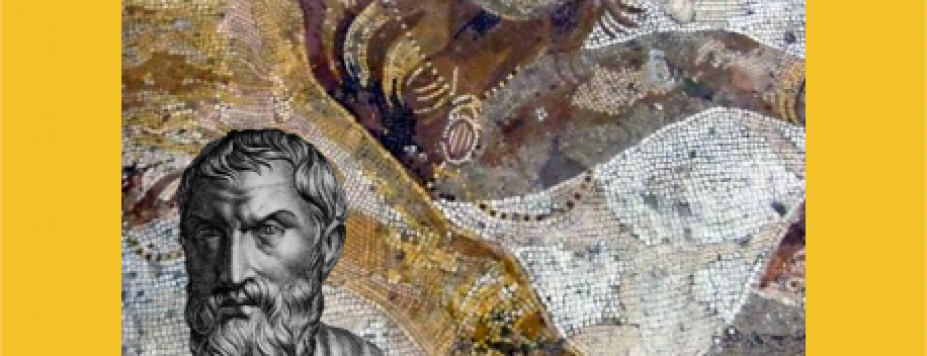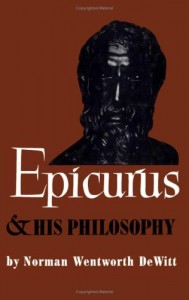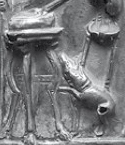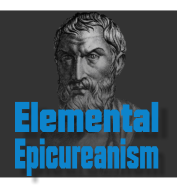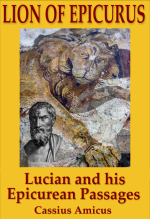 Work is continuing on a new ebook I have prepared on the Epicurean passages of the ancient author Lucian.
Work is continuing on a new ebook I have prepared on the Epicurean passages of the ancient author Lucian.
Lucian is identified on Wikipedia as Lucianus Samosatensis; c. A.D. 125 – after A.D. 180, an Assyrian rhetorician and satirist who wrote in the Greek language and is noted for his witty and scoffing work.
Epicurus.info and Epicurus.net have long highlighted Alexander the Oracle Monger and Zeus Rants for their Epicurean viewpoints, and to them I owe the inspiration and motivation to read further into Lucian’s work.
It is a goal here to turn my studies and readings into Epicureanism into material which others can use to improve their knowledge of Epicureanism, as I improve mine, so I have collected the best of Lucian’s compositions into EPUB format for use on Nooks, Ipads, mobile phones, and the like.
I have now “completed” my review of the remaining Lucian texts, and as a result I have prepared a revision and re-entitled the book Lion of Epicurus – Lucian and his Epicurean Passages, available here. The new title is a reflect of a passage in Lucian’s work entitled “Hermotimus, Or, The Rival Philosophies, which I found particularly compelling.
For those who are not familiar with the subjects treated by Lucian, below is an outline of topics which I prepared for the ebook:
- Alexander the Oracle-Monger
- Dealing with Alexander called for an Epicurus or a Metrodorus.
- The leading resistance to Alexander came from Epicureans, but the Stoics, Platonists, and Pythagoreans were his friends.
- The Alexandrians would call “Christians leave! Epicureans leave!”
- Alexander was afraid of Epicurus.
- An Epicurean challenges Alexander.
- Lucian extols the Principal Doctrines and Epicurus.
- Object of this work is to strike a blow for Epicurus.
- Zeus Tragoedus
- Damis the Epicurean questions whether the gods govern the world, and presents his argument.
- Damis argues that the gods do not concern themselves with men.
- The gods do not exert providential control.
- The gods do not punish blasphemy on their own.
- The gods are too busy to punish the wicked (according to the duties assigned them by the false philosophies).
- The argument that the universe appears to be ordered proves nothing.
- The poets are not to be believed, because their goal is fascinating stories, not truth.
- The stories of the poets are in fact absurd, not proof of divine providence.
- The fact that all nations seem to believe in the gods means nothing, as they all believe differently.
- The predictions of the oracles prove nothing, for they are often wrong.
- Thunder is proof of nothing as it is not from the gods.
- The argument that the universe is governed by god as if by a ship captain is wrong, because if the universe were captained like a ship it would not have so many injustices and so many things wrong with it.
- Attempting to prove god’s providence with a logical syllogism (that because there are altars there must be active gods) is laughably foolish.
- The Sale of Creeds
- Epicureans are the laughing creed, and they enjoy alcohol, and like sweets, honey, and figs.
- The Fisher
- Epicureans do not seek money, but seek pleasure instead.
- The Cynic philosopher in fact values gold and narcissism.
- False philosophers can be caught with baits of gold and fine foods.
- A Cynic is the first philosopher to take the bait.
- A Platonist takes the bait next.
- An Aristotelian bites next.
- A Stoic takes the bait.
- The Fishers depart to expose the Aristotelians, the Platonists, and the Stoics.
- A Slip of the Tongue In Salutation
- Epicurus valued joy but started his letters with Hail! (for health, which must come first).
- The True History
- Socrates is threatened with expulsion from the Heavenly Island for preaching nonsense.
- Plato is absent from the Heavenly Island because he is off composing his own Utopia.
- Epicurus is renowned in the Heavenly Island for his kindliness and sociability.
- The Stoics are absent because they are off climbing the hill of “virtue.”
- Chrysippus (leader of the Stoics) is barred from the Heavenly Island until he reforms.
- The followers of the Academy are not present on the Heavenly Island because they are not sure that the place exists.
- The followers of the Academy are also not present because they are not comfortable with the judgment of the king there, as they do not consider “judgment” to be possible.
- Those of the Academy who considered it worthwhile to seek out the island failed to reach it, as they gave up half-way on their quest.
- Incaromenippus – An Aerial Expedition
- The folly of those who postulate a creator but do not explain where that creator came from.
- Looking down from high above on those who fight over property shows how diminutive that property is, and from this perspective we see that those who concern themselves with the smallest of properties – Epicurean atoms – are the wisest of all.
- A goddess who tires of the duties which the non-Epicurean philosophers assign to her asks Zeus to pulverize them for making her perform so much work.
- The altars of the gods face the possibility of becoming as cold as the words of Plato or the Stoics.
- Zeus hesitates in which of two prayers to grant as both supplicants offer the same sacrifice, and in this hesitation he exhibits a suspension of judgment worthy of the Academic philosophers.
- Zeus shows his disfavor for Hermodorus the Epicurean.
- False philosophers are like actors, merely hired to pay a part for money.
- The sins of the non-Epicurean philosophers.
- The special insolence of the Epicureans in the eyes of Zeus for saying that the gods are not concerned with human affairs.
- The Double Indictment
- Zeus curses the non-Epicurean philosophers for saying that only the gods are happy, then burdening them with the governance of the universe.
- If Zeus nods for a moment, Epicurus is justified.
- The irony of Socrates holding that Justice is the highest good.
- The non-Epicurean philosophers talk only of justice.
- The Academics take both sides of the first legal case.
- The Academy’s meaningless platitudes.
- The case of the Stoics vs. Pleasure.
- The Stoics admit that they are not attractive, but claim that Justice is on their side.
- The Stoics ask if men are to live the lives of swine, or rather pursue “virtue.”
- The Stoics scorn happiness, as if men could find it in honey or figs.
- The Stoics call for a double punishment against those who follow Pleasure, because the followers of pleasure are both wrong and blasphemous.
- The Stoics call for men to disbelieve Epicurus.
- Epicurus speaks in defense of Pleasure.
- Epicurus says that if Pleasure calls us away from Virtue then it should be condemned, but it does not.
- Epicurus asks if we are to sacrifice the possibility of living happy lives for the sake of some promised “hereafter.”
- Epicurus says that the Stoics are hypocrites, and in private pursue pleasure.
- Epicurus says that those who talk nonsense about the iniquity of pleasure only toy with words – their thoughts are bent elsewhere.
- The Court rejects the Stoic cross–examination of Epicurus because it is based on word-chopping.
- The Stoics lose the case and appeal to Zeus, as they are always tiresomely doing.
- The Court postpones the hearing of the case of Luxury vs. Virtue, because it rests on the same argument as the case of Pleasure vs. Virtue, which is now on appeal to Zeus.
- The Parasite, A Demonstration That Sponging Is A Profession
- What Pleasure really means is bodily tranquility and an untroubled soul.
- How Epicureanism differs from “sponging.”
- Examples of Socratic and Platonic spongers.
- Aristotle was a sponger.
- These non-Epicurean philosophers never fought in battle.
- An exception who did go to war was Socrates, but he fled in battle.
- The Liar
- Superstition is a circular argument.
- The gods may in fact exist even while the superstitions about them are lies.
- An Aristotelian philosopher spouts superstition.
- If I too had seen what you are spouting about, I too would have believed. But I did not, and I do not.
- The words of Plato make little impression on ordinary men.
- Our teachers are like babies; distinguishable mainly because the teachers have grey hair.
- The Epicureans criticize divine Plato and his views of the afterlife.
- A slam at the Pythagoreans, who ought to know better but are still superstitious.
- “I do not believe in the supernatural, because, unlike the rest of mankind, I do not see it: if I saw, I should doubtless believe, just as you all do.”
- The example of Democritus, who had so little fear of ghosts that he set himself up to work in a tomb.
- A dismissal for those for whom human affairs are such insufficient occupation that they must occupy themselves with superstition.
- Truth and good sense: these are the drugs for our ailment; let us employ them, and that empty thing, a lie, need have no terrors for us.
Hermotimus – Or, The Rival Philosophies
- The problem of how to know a lion if one only sees the lion’s foot, and one has never seen a lion before.




